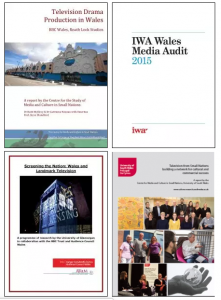Research Network: Television from Small Nations
Reports

Reports
Television from Small Nations: Building a network for cultural and commercial success
Full articleThis multidisciplinary, international research network was established with a grant from the Arts and Humanities Research Council in order to address the specific challenges and opportunities facing television broadcasters and producers in small nations. For small nations the television industry performs a number of important cultural, political and economic functions: constructing cultural identities, contributing towards a democratic public sphere, and enabling minority-languages to thrive in the modern world. However, several structural challenges shape their TV industries including less access to talent, fewer capital resources, higher production costs, and a smaller market for advertising and licence fee revenue. The network directly addressed these imperatives by drawing together academic experts and key stakeholders in the television industry, and enabling them to identify the necessary conditions for sustained success in both cultural and commercial terms. A total of 63 participants came from 12 different countries across Europe. Their expertise spanned academia, policy, public sector broadcasting and independent television production. This report details the main findings of the network.
Television Drama Production in Wales: BBC Wales, Roath Lock Studios
Full articleSince its establishment in 2006 the Centre for the Study of Media and Culture in Small Nations, University of South Wales, has engaged in dialogue with various stakeholders about the challenges and opportunities for drama production in and from Wales. In 2010 in conjunction with the BBC Trust and Audience Council Wales the centre published the report Screening the Nation, which examined the portrayal of Wales in landmark BBC television dramas (Blandford et al. 2010), capturing the centrality of television drama to citizenship and identity in Wales. The next phase of this research agenda coincided with the opening of the BBC’s Roath Lock Studios in Cardiff. While the focus of the research was the investment at Roath Lock other developments such the investment in Cardiff by Pinewood studios and Tony Hall’s provocative speech in 2014 highlighted that this was an important moment in the development and sustainability of the Welsh television sector. This research contributes to the on-going debates about both public service broadcasting and the wider creative sector in Wales and its ambition to be a serious contender in the television production market.
Our work on Roath Lock is based upon two key research questions:
- What was the rationale behind the development of the Roath Lock studios as a centre for
television drama production? - What does this new facility means for Wales and its creative industries?
This report summarizes the main findings and outlines the next phase of our research.
IWA Wales Media Audit 2015
Full articleIt is through a flourishing and enterprising media that we know ourselves and others. The media join the dots for our society – from education to transport, health to business – and provide the underpinnings of a vibrant political culture. Civil society depends on accurate and mature media. At a time when Wales as a democratic entity has never been more clearly defined, the sources of information for debate and scrutiny about our Government, culture and identity are drying up. This presents a major challenge to our society and democracy, and deserves to be taken seriously. To achieve good policy, comprehensive information is needed along with reliable analysis and that is what this audit of press, online and broadcast media sets out to present, along with policy recommendations rooted in the data.
Screening the Nation: Wales and Landmark Television
Full articleThe research, on which the study is based, attempted to find some answers to the following questions:
– What does it mean to say that a city, or a nation, is portrayed (or not) in television drama, and why is this important?
– What sense do audiences in Wales make of the representation of Cardiff and south Wales in high-profile landmark television dramas such as Doctor Who and Torchwood?
– In what ways might the answers to the above questions contribute to ongoing debates about the Nation and the ‘imagined community‘ (Anderson 1983) of Wales?
The study closely involved the BBC Audience Council Wales, which provided invaluable advice and feedback as the research progressed. We hope that it provides the BBC Trust with research that investigates the complex relationship between television production, its locations and the impact on local, regional and national identity.
